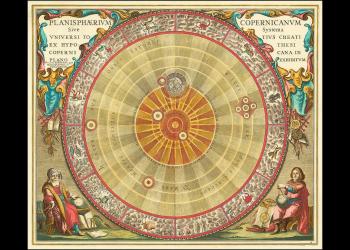A Copernican Moment: Humanity’s Interdependence and the Global Order
By Daniel Perell
Humanity’s growing global interdependence calls for a profound paradigm shift—from one fixated on unbridled nationalism to one more reflective of a world interconnected in all aspects of life. Admittedly, this may sound far-fetched in the present moment. But what was once seen as an idealistic vision of international cooperation has, in light of the obvious challenges facing humanity, which grow more severe each day, become an urgent and pragmatic necessity.
I am reminded of Copernicus who realized that, contrary to the earth-centric model dominant at his time, the earth orbits the sun. But so strong was the dogma of his day that, despite mounting evidence, it took more than a century until this truth was accepted. A comparable shift in thinking is needed in global governance and international affairs: we must reconceptualize our models, not with global coordination revolving around the needs of the State, but rather with the State seeing itself as part of an entire global system.
Today the nation-state remains the key organizing unit of the global order. Aspirations toward global governance or other systems of international cooperation are treated as subordinate to the nation-state; just as the sun, it was believed, revolved around the earth. In the latter case, the field of science advanced and the dominant view eventually became untenable. But this shift posed an unwelcome challenge to the ruling elite, and it took generations before pride gave way to acceptance of what is now known to be an obvious truth.
Similarly, contemporary systems and structures—political, economic, environmental—are demonstrating their limits in the face of a reality that is increasingly integrated and interdependent. So too is it becoming more clear that certain issues cannot be adequately addressed without their effective consideration at different levels, thereby calling into question the centrality and exclusivity of the nation-state as the primary organizing unit of governance.
All indicators of our interdependence, not to mention demands for global solidarity, are shining a light on the incoherence of attachment to such an outworn model. Yet, we continue to make policy as if nations were operating in isolation, as if the practices of one do not profoundly impact another, as if the markings on a map are reflective indicators of the worth of a people beyond those bounds. We must ask whether the leaders of today are able to change unbridled state-centric convictions, which are proving so detrimental to a socially, technologically, and ecologically connected world.
To treat our global order like the sun in the solar system may raise alarm bells about the end of State sovereignty and the creation of a centralized global executive. Indeed, changing nothing about our models, except what comes at the center, is a legitimate concern. But what a paradigm shift does is change a whole understanding, opening vistas previously unconsidered. Returning to the Copernican analogy, the shift in understanding neither changed the immediate human experience of night and day, nor of how the seasons change. It allowed humanity, however, to better understand the earth’s place in relation to other celestial bodies; since then, this more accurate description of reality has resulted in tremendous advances in a host of fields.
The fact that humanity is interdependent will remain unchanged—regardless of whether we accept that all nations are elements of a whole. Evidence is mounting that the world cannot prosper if nations see themselves in opposition to one another. We have seen this in our responses to the pandemic, and we are seeing this now in our approach to climate change. Whatever benefits have accrued from past conceptions of state sovereignty, present conditions demand a far more holistic and coherent perspective. Rebalancing focus from individual nations to an integrated global order, in its entirety, is perhaps a more accurate reflection of the reality in which we now find ourselves. Conceiving of the global order in this way can lay foundations for nations and localities to situate themselves in harmony with the rest.
Ultimately, seeing the world as one cannot be a threat to State sovereignty, local autonomy, cultural diversity or human freedom; instead, perhaps it will reveal a richer, more enhanced form of sovereignty, where the needs of all people and nations are met. A healthy world order will be one that functions because it embraces the interdependence and interconnection of all, arranging its affairs in light of that appreciation, thereby advancing the world in new and creative ways. Unlike the fate of the Copernican theory, let it not take another century for this truth to be given life.
Daniel Perell is a Representative of the Bahá’í International Community to the United Nations
